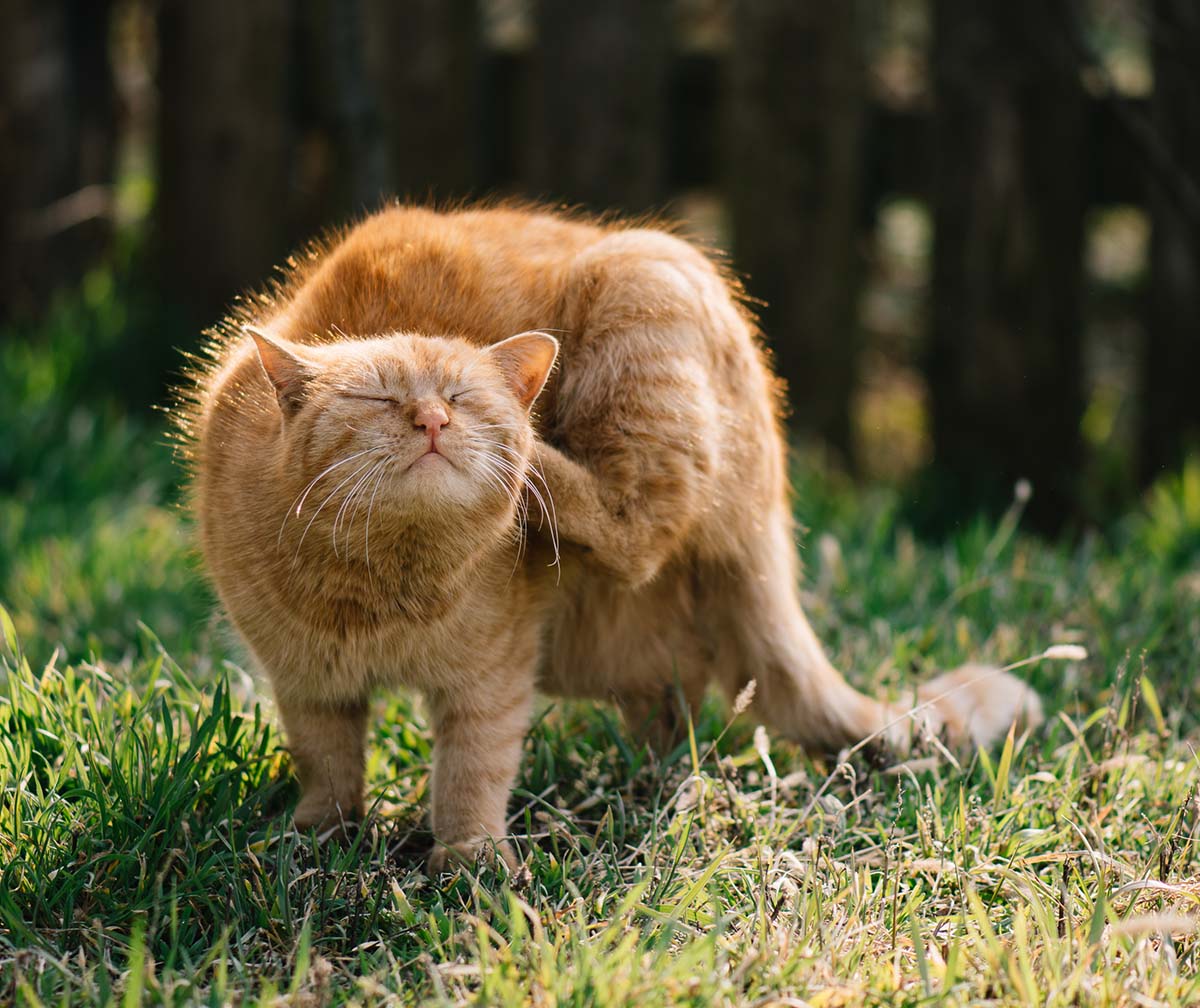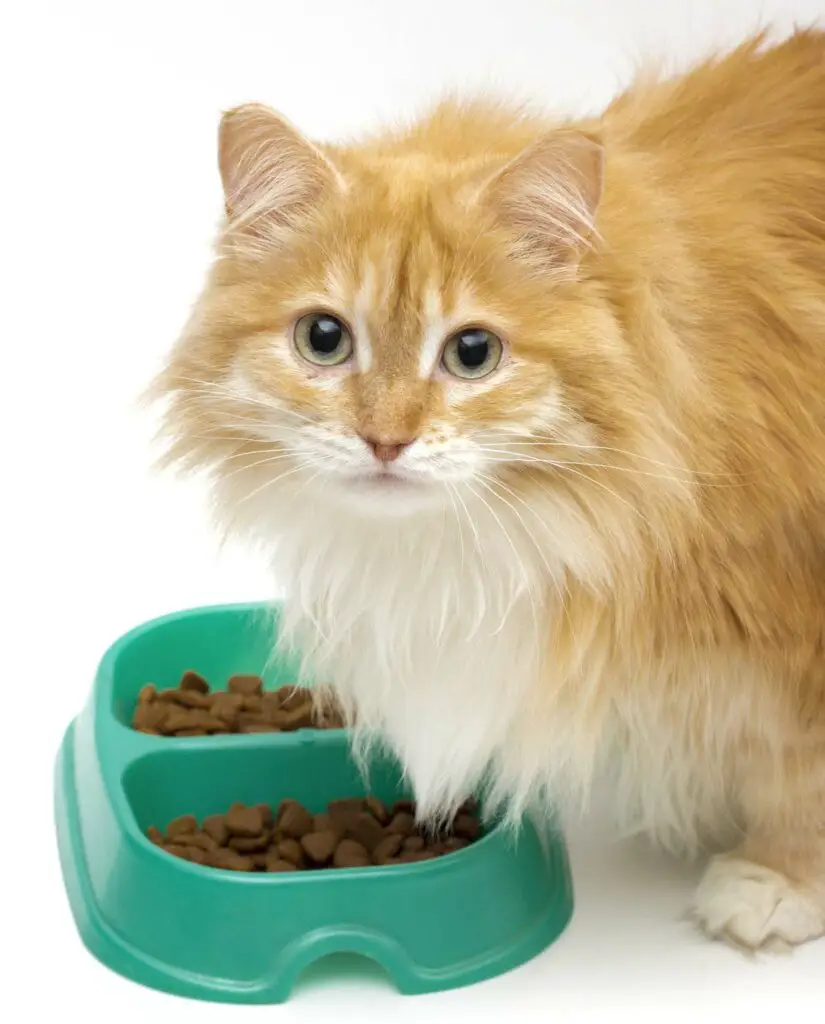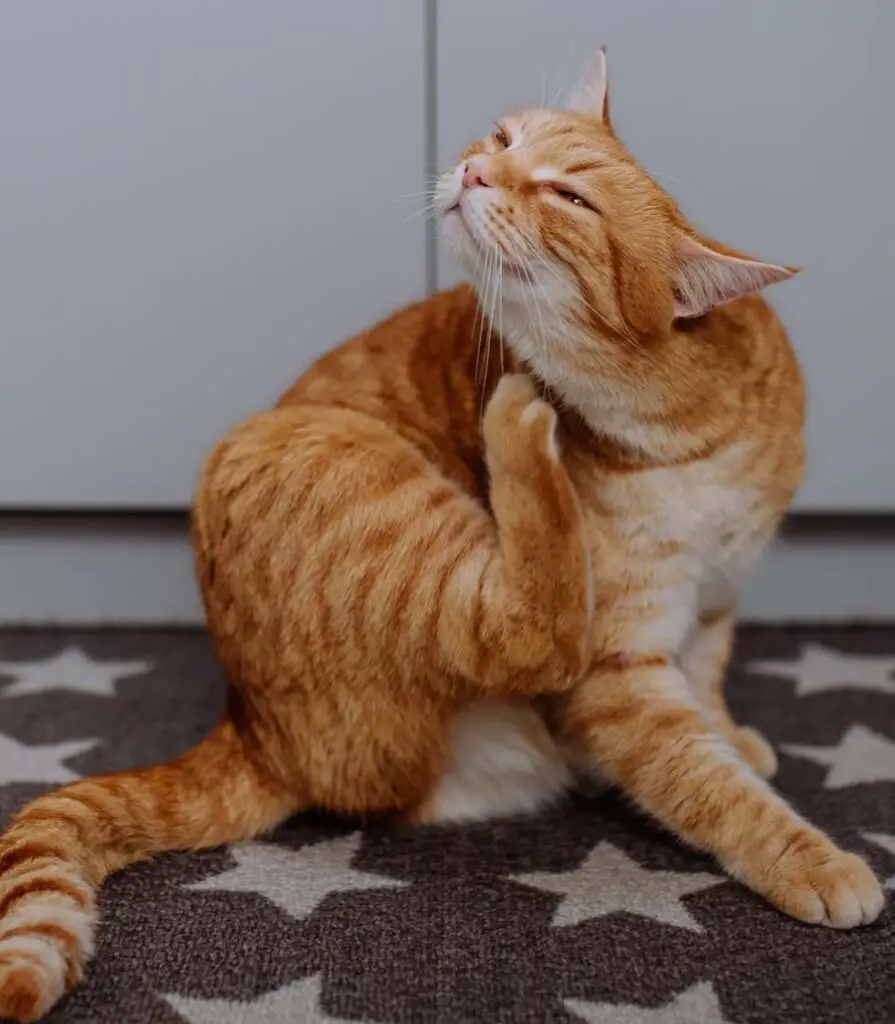Is Your Cat Scratching Head Until it Bleeds?
Scratching is a normal habit for cats as part of their grooming process. But what if your cat is scratching its head until it bleeds?
Excessive scratching is a sign of a bigger problem in felines. If not addressed immediately, your kitty will develop wounds that could get infected.

Remember that pets don’t know when to stop scratching, even if they are getting injured. As long as they feel itchy, they keep scratching until they find relief.
In this post, I discuss why a cat scratches its head excessively and how you can stop it.
Why is my cat scratching his head raw?
Excessive scratching in felines can happen for a variety of reasons. If your kitty is scratching its head to the point of bleeding, the following might be the reasons why:
1. Parasites
Parasites are the leading reason why your cat may scratch its head until it bleeds. It could be mites, fleas, or ticks biting your pet’s head.
These bites are itchy and irritating, forcing your pet to scratch. Until the parasites are resolved, your cat will keep scratching its head.
Remember that constant scratching can cause open wounds on your cat’s head. Such wounds can become infected, making your pet’s condition much worse.
Aside from scratching, here are other signs that your cat has ectoparasites on its head:
- Bald spots around the head and body
- Sore skin and redness
- Black or brownish specs on the cat’s fur
- Pale gums
- Behavioral changes (example: becoming more irritable)
If you notice any of these on your cat, you must consult a vet as soon as possible. This way, you’ll know what treatment is best, depending on the type of parasite your pet has.
Please note that some topical parasites in cats aren’t easily visible until they are in the advanced stage. Still, you can spot them faster if you make it a habit to brush and check your pet’s coat.
2. Allergy
If your cat is parasite-free, the culprit could be allergies. This condition triggers aggressive scratching to the point of bleeding.
Allergies occur when the cat’s immune system falsely detects a substance to be harmful. This causes severe itching, diarrhea, vomiting, and a slew of other symptoms.
Aside from your cat’s head, itchiness due to allergies will occur on the rest of its body. Unless the allergy is addressed, your pet will continuously suffer discomfort.
Feline allergies can be due to food, parasites, or environmental elements. The only permanent cure for this condition is avoiding the allergen as much as possible.
The vet is always the best to consult if you’re unsure what causes your cat’s allergies.
3. Food intolerance
Another possible culprit to your cat’s non-stop head scratching is food intolerance. Unlike allergies, food intolerance occurs when a cat can’t digest a specific food ingredient.
In short, food intolerance is a digestive response, while food allergy is an immune response.
But the same with allergies, food intolerance will cause intense skin problems. Your cat won’t stop scratching its head and body, even if it sustains wounds.

Contrary to what some pet owners think, continuous exposure to the food ingredient will not make your cat’s intolerance go away. In fact, continued consumption of the ingredient will only make your cat’s condition worse.
Also, a cat can have an intolerance to almost any food item. Your pet’s veterinarian can run tests to determine which ingredient is the culprit.
4. Insect bites
Your cat isn’t invincible to the wrath of mosquitoes. These blood suckers can bite non-hairy areas of your cat’s body, like its ears and nose.
For short-haired and hairless breeds, insect bites would be much more prevalent. It can cause severe itching around the head area, which the poor feline will scratch incessantly.
Take note that some cats may get an allergic reaction from insect bites. This will worsen the itching, which could explain why your pet is scraping its head despite the wounds.
The good thing is that insect bites are easy to treat. Most vets will recommend topical creams to alleviate the itching, but you may need to put your cat in an Elizabethan collar.
5. Dry skin
Cats can get dry skin, too, which is itchy and prone to irritations. This happens when the feline lacks enough nutrition to sustain a healthy coat.
Dry skin can develop anywhere in your pet’s body. It can occur on its head, neck, chest, and tail.
However, since kitties can easily scratch their noggins, an itchy head is more prone to over-scratching and bleeding.
Aside from that, dry skin in cats is more common during the winter season. The cold temperature can draw out moisture from your cat’s skin, which causes dryness and itching.
6. Head pain
Take note that scratching isn’t just about itchiness. Cats will also paw their heads if it’s painful until they sustain wounds.
This may appear as if your cat is scratching, but it’s just your pet’s way of helplessly trying to get rid of the discomfort. It could be due to trauma or an underlying health problem.
Felines may experience headaches if they are dehydrated, stressed, or dealing with allergy symptoms. Dental problems and fever can also make your kitty’s little head ache.
But on a more serious note, cat headaches can also be a symptom of feline brain diseases. It’s best to get your cat checked at the vet if the symptoms persist.
7. Compulsive disorder
But what if my cat is completely healthy and does not experience itching? In that case, the scratching might be a compulsive behavior.
Compulsive behavior is characterized by repetitive behavior to soothe an obsession temporarily. In felines, this behavior could be scratching, chewing, biting, or licking.
Moreover, compulsive scratching can cause bleeding on different parts of your cat’s body. And since it’s not caused by an infection or allergy, this behavior can be challenging to deal with.
Take note that compulsive behavior like this can be triggered by significant changes in your cat’s environment. It could happen if you recently moved to a new house, someone passed away, or you brought home a new pet.
It may start as anxiety until it develops into a full-fledged compulsive behavior. Without proper intervention, this condition will be very harmful to your cat.
How do I get my cat to stop scratching her head?
The first step to stop your cat’s head scratching is to determine its cause. From there, you can take the proper action as guided by a veterinarian.
Depending on your cat’s condition, the following might be the solution:
1. Get rid of parasites
If your cat’s obsessive head scratching is due to ectoparasites, eliminating the biters would be the best course of action.
There are many over-the-counter fleas, mites, or tick treatments that you can try. But to remove the guesswork, I recommend consulting your cat’s vet first.
Take note that these treatments need to be appropriately administered. Also, it may not be suitable for very young cats.
Usually, the vet will recommend a medicated shampoo product to get rid of the parasites on your cat’s coat. It may take a few days to weeks to remove all the critters.
You must keep your guard up even after your cat is parasite-free. You can ask the vet for a preventive treatment applied about once a month.
2. Change your cat’s diet
For allergies and intolerances, switching your cat to a new food is the only solution. Ensure that the new food doesn’t have the ingredient triggering the problem.
Also, you must perform the diet switch slowly to avoid tummy troubles in your cat. Start by replacing a quarter of your cat’s meal with the new food and increase it as days go by.
Aside from that, consider getting a cat food product rich in Omega fatty acids and Vitamin E. These two substances support coat health to reduce the risk of itching.

3. Use an Elizabethan collar
You can use a pet cone to prevent your cat from scratching its head. This is very helpful while trying to treat or figure out the cause of the problem.
Aside from that, a pet cone is necessary if you’re going to apply any topical medication on your cat’s wounded head. This is to prevent further scratching and potential ingestion of the medication.
4. Consider using antihistamines
You can also ask the vet if you can give your cat a dose of antihistamine. This is often used to treat allergy symptoms like itching.
It’s essential to consult the vet because antihistamines must be given at a specific dose based on the cat’s size and health. Too much antihistamine can lead to untoward reactions in your cat and even an emergency situation.
5. Bring your cat to the vet
The best way to stop the harmful head scratching is to let a veterinarian examine the kitty. A vet may perform a series of tests to determine the real cause of the behavior and what treatment can be done to stop it.
While this will cost a fee, it’s still the best way to treat your cat. Take note that self-medicating your pet often does more harm than help.
6. Keep nails trimmed
It’s possible that your cat’s nails are too long and sharp and is adding to injury when your cat is scratching itself. Make sure to keep up with your cat’s grooming and clip its nails. Read here for more tips on grooming your cat.
Also provide cat scratchers so your cat can groom its nails themselves.
Cat scratching head until it bleeds. Is that normal?
It’s not normal for cats to keep scratching until their heads start bleeding. This behavior is a sign that your pet is suffering from an underlying condition.
This problem should be addressed to prevent further discomfort on your cat’s part. Take note that the wounds on your cat’s head can get infected, too, if not treated or scratched repeatedly.
Why does my cat scratch the top of their head?
A cat may scratch the top of its head if something is causing it to itch. It could be an insect bite, parasite, and allergy. However, it can also be due to pain from either external or internal reasons.
Head scratching is normal in cats. But if this behavior is becoming obsessive, that’s the time you have to get the vet involved.
Can I put Neosporin on a cat’s head?
While Neosporin is an effective topical treatment for cuts, it shouldn’t be used on animals. This medication can trigger further irritations in felines and make the itching worse.
Instead, you should call your cat’s veterinarian to ask for cat-appropriate medication. Most of the time, you can purchase over-the-counter ointments from pet stores, which helps alleviate head itching.
Aside from Neosporin, never apply Vicks Vaporub, Vaseline products, and other human-grade topical treatments on your cat’s head. These can have life-threatening consequences, especially if your kitty ingests them.

Conclusion
Cats are natural groomers, but their scratching shouldn’t lead to bleeding. If it does, you have to intervene to know the cause of the problem.
Like I always say, the vet is the best person to consult since each cat is different. This means that the treatment that worked for your friend’s pet may not be suitable for your cat.
